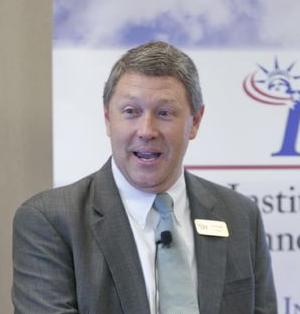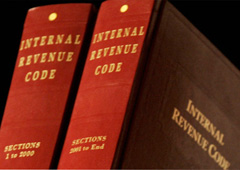
Tom Giovanetti is president of the Institute for Policy Innovation (IPI), a 38-year-old conservative, free-market public policy “think tank” based in Dallas, Texas.
In addition to his administrative and fundraising duties, Tom writes for IPI and for leading publications on a variety of policy topics including tax policy, economic growth, self-government, civil liberties and constitutional protections, judicial supremacy, intellectual property, Social Security personal accounts, technology and Internet policy, and government spending. In addition to being regularly published in major outlets including the Wall Street Journal, Washington Times, FoxNews.com and The Dallas Morning News, Tom writes often for the Fort Worth Star-Telegram. Tom frequently appears in the media and is a regular guest and occasional substitute host of the Mark Davis Show in the Dallas-Fort Worth market.
Tom loves thinking out-of-the-box to design novel solutions to policy problems and explaining complicated policy issues in ways average folks can understand.
Tom's mission at IPI is to use issues to teach conservative, free market thinking and to push back against unprincipled populism. He seeks to encourage continued skepticism of Big Government, to maintain faith in markets, and to defend individual liberty as the best means of achieving human flourishing. His most recent work has focused on free market solutions to student loan debt, preserving online freedom, and persuading state legislatures to override local and municipal rules that restrict economic liberty.
Mr. Giovanetti has represented IPI at many national and international organizations, including the World Intellectual Property Organization (WIPO), the Internet Governance Forum (IGF), and represented IPI during negotiations on the Trans-Pacific Partnership (TPP) trade agreement. Mr. Giovanetti is a popular speaker and writer and testifies before state and federal legislative committees on a variety of topics.
Follow Tom on Twitter (X) at @tgiovanetti
'Forfeiture' of Assets to Government is an Affront to Rights
In current practice, the owner of the forfeited property does not have to be convicted or even charged with a crime for property to be taken and kept by the government. It is as if the property itself is guilty, rather than its owner. And it only gets worse from there.
Missing the Biggest Point on Corporate Tax Reform
The corporate tax is actually a hidden tax on employees, shareholders and consumers. When we raise taxes on corporations, they simply pass the tax along in the form of lower wages, lower dividends, and higher prices.
Is SEC's Power Grab More Important Than the Fourth Amendment?
The SEC is holding up ECPA reform in an attempt to parlay more agency power, demanding a carve-out in any updated ECPA bill that would give the agency power to access your data without a warrant.
'Tis the Season for PITFA
Speaker Ryan has an opportunity to make his mark by moving pieces of legislation that are relatively non-controversial and have broad support. The most obvious candidate is the Internet Tax Freedom Act (ITFA), set to expire Dec. 11, which bans taxes on Internet access and bans taxes that discriminate against ecommerce.
Internet Tax Freedom Forever Act Passes Congress
Congress has voted to permanently bar state and local governments from taxing access to the Internet. For 17 years, the ban on Internet taxes has benefited millions of Americans by empowering them to conduct transactions on the Internet free from the fear of additional tax burdens. "This is a tremendous victory for America's Internet economy, and for all of us who participate in this economy", said Institute for Policy Innovation president Tom Giovanetti.
Senate Passes Customs Bill With PITFA Intact
Passage of PITFA as part of HR-644 now "intensifies" S-698 opponents' push to "stave off the attempt" to pass that bill, said IPI president Tom Giovanetti in a statement. S-698 "has never had committee scrutiny on the Senate side and [has] never been subject to amendment on the floor." Senate Republican leaders "must commit to first submitting this legislation to the same procedures, hearings and scrutiny appropriate to any and all legislation, especially since this proposal has serious Constitutional questions," Giovanetti said.
Powell Praises PITFA Passage
Fans of the just-passed permanent Internet Tax Fairness Act (PITFA), which bans taxes on Internet servcie, were weighing in Thursday (Feb. 11), including warning about the Internet sale tax legislation whose future consideration was a tradeoff for that passage.
Washington Must Act On Freeing Wireless Spectrum
Washington must ensure that spectrum is being freed-up and made available for use on a regular basis in order to keep the critical wireless economy going and growing. But we’re reaching the point where the largest, most inefficient holder of spectrum is in fact the federal government.
Brady Briefing: Ways & Means Important to Texas, U.S.
Tom Giovanetti, president of the freedom-oriented IPI, recently wrote “Now that Texas Republican Kevin Brady chairs the Ways & Means Committee, he will have more to say about the details of any eventual tax reform than will the future president. So what really matters is Brady’s priorities…and they are encouraging”.
Comparing the Major Candidates' Tax Plans
Most of the major presidential candidates have released tax reform plans with enough specifics to run them through an economic model. On tax policy, Republicans tend to focus on economic growth, while Democrats tend to focus on distributional effects.


.jpg)




